#publishing fiction
Note
If you don’t mind me asking, how did you find a writing agent to represent you? Been interested in writing a book for a while and I thought you might have some pointers since your posts are so informative and I think you’re an awesome writer :)
Great question, and thank you so much!
Background: The reason you get an agent is because you're interested in having your book published by a publisher (not self-publishing). Not all publishing houses require you to have an agent, but all of the big ones do, and many of the other legit ones. Some big exceptions are boutique small presses, like Ylva, for example, who accept unagented submissions and sometimes even solicit people.
But in most cases, if you want to be published by a publishing house, you need an agent, which is because these houses do not accept book submissions from authors. they only accept them from agents; ergo, to be published you need to submit, and to submit you need an agent.
Answer to your question: The way you get an agent is by applying, a lot like a job application. Here are the steps:
You need to write your whole book first (unless it's nonfiction) and have it be as good as you can possibly make it. That means beta readers, editing rounds, everything. Get it to the level where if you were self publishing, you'd be done.
You write what's called a query letter for your book, which is essentially a cover letter. Title, word count, comparison titles, plot hook, character intros, take them through about 50% of the plot, establish clear stakes, plus a bio about you. All of this in 400 words, mind you. This is often the hardest thing you'll ever write. I find the podcast "The Shit No One Tells You About Writing" to be the very best way to learn how to do this, and also a LOT of great stuff about writing craft. I listen religiously even though I haven't queried in years.
Research agents. There are thousands of agents out there. Some don't rep in your genre, some are not accepting queries (only working with the clients they already have). You can follow them on social media and search "Manuscript Wishlist" or MSWL to see what they are looking for.
Start querying! Send your query letter and sample pages (usually the first 10-50 pages, depending on what each specific agent wants) to agents, usually in batches of 10-15 at a time.
WAIT
Some agents get back to you very quickly. Most never get back to you at all, and you figure sometime between 6 weeks and 6 months is a pass. It's a very awful, sad, dehumanizing process that you need to be prepared for.
I queried for a year. I queried 65 agents. I only received one offer of representation. I think this low success rate was because I had a weird book that was outside of any typical genre (this was my fault, not that I created something new) and a bad query letter, but my writing was good and my now-agent saw potential in me.
But I will say this: If the only reason you want to write a book is to be published, you should either be good with self-publishing, or not do it. The odds of being published are astoundingly low. There are many many more talented authors than there are slots for debut novels. It takes talent and perseverance and luck to make it through all of these processes and emerge with a book deal, especially from a large publishing house that will pay you an advance and treat you well.
So I'd say, write the book if you want to write the book. Make it a joyful process whose best possible outcome is it being written. And then when you're done with it, if you're ready to drink from a firehose of research, resources, rejection, and hope, then fucking do it!
24 notes
·
View notes
Note
Heeeey! As someone who has read and re-read and re-read again everything you've posted on AO3, I'm so, so excited about reading your book! I don't have a writing ask, but I have questions about how to be a good reader. Best place(s) to purchase that would help boost you the most? If purchasing a physical book is not feasible, best place(s) to purchase an ebook? Does buying the physical book *and* the ebook help boost you more? If there's an audiobook, where is the best place to get that? Does renting from the library (either physical or on Libby) also help boost you? What can we do to help make this release a success and ensure you get more and more books picked up?
First of all, this is so incredibly kind of you and I love you now and FOREVER!!!!
Second, here's the general details, but I'll know more when it gets closer so sorry if i'm lying!
In general, the best thing you can do is buy the book in any format. Hell, buy two! Sales are a huge indicator for if I'll be seen as "successful" and get more book deals. So if money isn't happening for you, that's totally cool, but see if you can get a friend or mutual or gay cousin to buy it! Spreading the word is the best possible thing, because marketing is hard as shit!!
In terms of sales: per my contract, I get (a very standard) 7.5% of paperback sales, 10% of audiobook sales, and 25% of ebook sales. But those may all be priced differently, there may be sales, etc., so it's not like ebook is a slam-dunk-more-money-situation. I have no idea what happens with things like Audible where people use credits? I assume I get paid for that? I dunno.
Renting from the library is absolutely great, especially requesting it if your library doesn't have it, or requesting it in audio if they only have paperback, for example. When the library buys it, that counts as buying it for me! And the more demand they have, the more copies they'll get.
My impression is that local bookstores can really help move copies if they like the book and recommend it. So preordering through your local indie could give them a hint they should read it, order a bunch of them, and sell them, hopefully!
Buying online is also lovely. There's bookshop.org which delivers, so I try to do that instead of amazon if I'm buying a physical copy online. I usually get my ebooks from amazon because I dunno where else, and audiobooks from audible if I buy them.
14 notes
·
View notes
Text
fav place to post free serial fiction?
hello kind folks of writeblr~
so, I’m searching for a home for Queensmen, my novel about war weapon elf gal, a cranky noble tied up with a death goddess, and a turncoat exile, and how they all try to pull a goddess back to earth and maybe fall in messy love in the process.
Is there somewhere that people favour to read or post free chapter-by-chapter fiction?
I know of Wattpad, AO3, & Royal Road, but that’s essentially it. (Queensmen is technically on RR, but doesn’t fit their genres and has not been getting much of an audience from that site.)
Thank you!! also sorry if this gets asked a lot i’m brand new here
#vanessa.txt#writeblr questions#writeblr#publishing fiction#serial fiction#publishing serial fiction
51 notes
·
View notes
Text
Submission Spotlight: Blackbird
A lot of literary journals have closed until fall. This gives us months to dust off old stories and see if we can whisk them up into something tasty. When that happens, the online journal Blackbird is a great place to send stuff. #writing #publishing
Okay, so the bad news is that a lot of literary magazines have closed their doors until fall. The good news? You’ve got a few months to pull up that piece you’d given up on, dust it off, and see what you can make of it. If it fluffs up into something pretty tasty, Blackbird might be the literary magazine for you.
Since 2001 (or 2002—different places on their website name different founding…

View On WordPress
#Blackbird#classism in publishing#diversity in publishing#Gregory Donovan#literary editors#literary magazines#literary marketplace#M.A. Keller#Mary Flinn#New Virginia Review#online literary journals#Patricia García Luján#paying markets for short stories#publishing fiction#publishing short stories#submissions#Submittable#submitting fiction#Virginia Commonwealth University
1 note
·
View note
Text
The majority of censorship is self-censorship

I'm on tour with my new novel The Bezzle! Catch me TONIGHT in SAN DIEGO (Feb 22, Mysterious Galaxy). After that, it's LA (Saturday night, with Adam Conover), Seattle (Monday, with Neal Stephenson), then Portland, Phoenix and more!

I know a lot of polymaths, but Ada Palmer takes the cake: brilliant science fiction writer, brilliant historian, brilliant librettist, brilliant singer, and then some:
https://pluralistic.net/2022/02/10/monopoly-begets-monopoly/#terra-ignota
Palmer is a friend and a colleague. In 2018, she, Adrian Johns and I collaborated on "Censorship, Information Control, & Information Revolutions from Printing Press to Internet," a series of grad seminars at the U Chicago History department (where Ada is a tenured prof, specializing in the Inquisition and Renaissance forbidden knowledge):
https://ifk.uchicago.edu/research/faculty-fellow-projects/censorship-information-control-information-revolutions-from-printing-press/
The project had its origins in a party game that Ada and I used to play at SF conventions: Ada would describe a way that the Inquisitions' censors attacked the printing press, and I'd find an extremely parallel maneuver from governments, the entertainment industry or other entities from the much more recent history of internet censorship battles.
With the seminars, we took it to the next level. Each 3h long session featured a roster of speakers from many disciplines, explaining everything from how encryption works to how white nationalists who were radicalized in Vietnam formed an armored-car robbery gang to finance modems and Apple ][+s to link up neo-Nazis across the USA.
We borrowed the structure of these sessions from science fiction conventions, home to a very specific kind of panel that doesn't always work, but when it does, it's fantastic. It was a natural choice: after all, Ada and I know each other through science fiction.
Even if you're not an sf person, you've probably heard of the Hugo Awards, the most prestigious awards in the field, voted on each year by attendees of the annual World Science Fiction Convention (Worldcon). And even if you're not an sf fan, you might have heard about a scandal involving the Hugo Awards, which were held last year in China, a first:
https://www.nbcnews.com/news/world/science-fiction-authors-excluded-hugo-awards-china-rcna139134
A little background: each year's Worldcon is run by a committee of volunteers. These volunteers put together bids to host the Worldcon, and canvass Worldcon attendees to vote in favor of their bid. For many years, a group of Chinese fans attempted to field a successful bid to host a Worldcon, and, eventually, they won.
At the time, there were many concerns: about traveling to a country with a poor human rights record and a reputation for censorship, and about the logistics of customary Worldcon attendees getting visas. During this debate, many international fans pointed to the poor human rights record in the USA (which has hosted the vast majority of Worldcons since their inception), and the absolute ghastly rigmarole the US government subjects many foreign visitors to when they seek visas to come to the US for conventions.
Whatever side of this debate you came down on, it couldn't be denied that the Chinese Worldcon rang a lot of alarm-bells. Communications were spotty, and then the con was unceremoniously rescheduled for months after the original scheduled date, without any good explanation. Rumors swirled of Chinese petty officials muscling their way into the con's administration.
But the real alarm bells started clanging after the Hugo Award ceremony. Normally, after the Hugos are given out, attendees are given paper handouts tallying the nominations and votes, and those numbers are also simultaneously published online. Technically, the Hugo committee has a grace period of some weeks before this data must be published, but at every Worldcon I've attended over the past 30+ years, I left the Hugos with a data-sheet in my hand.
Then, in early December, at the very last moment, the Hugo committee released its data – and all hell broke loose. Numerous, acclaimed works had been unilaterally "disqualified" from the ballot. Many of these were written by writers from the Chinese diaspora, but some works – like an episode of Neil Gaiman's Sandman – were seemingly unconnected to any national considerations.
Readers and writers erupted in outrage, demanding to know what had happened. The Hugo administrators – Americans and Canadians who'd volunteered in those roles for many years and were widely viewed as being members in good standing of the community – were either silent or responded with rude and insulting remarks. One thing they didn't do was explain themselves.
The absence of facts left a void that rumors and speculation rushed in to fill. Stories of Chinese official censorship swirled online, and along with them, a kind of I-told-you-so: China should never have been home to a Worldcon, the country's authoritarian national politics are fundamentally incompatible with a literary festival.
As the outrage mounted and the scandal breached from the confines of science fiction fans and writers to the wider world, more details kept emerging. A damning set of internal leaks revealed that it was those long-serving American and Canadian volunteers who decided to censor the ballot. They did so out of a vague sense that the Chinese state would visit some unspecified sanction on the con if politically unpalatable works appeared on the Hugo ballot. Incredibly, they even compiled clumsy dossiers on nominees, disqualifying one nominee out of a mistaken belief that he had once visited Tibet (it was actually Nepal).
There's no evidence that the Chinese state asked these people to do this. Likewise, it wasn't pressure from the Chinese state that caused them to throw out hundreds of ballots cast by Chinese fans, whom they believed were voting for a "slate" of works (it's not clear if this is the case, but slate voting is permitted under Hugo rules).
All this has raised many questions about the future of the Hugo Awards, and the status of the awards that were given in China. There's widespread concern that Chinese fans involved with the con may face state retaliation due to the negative press that these shenanigans stirred up.
But there's also a lot of questions about censorship, and the nature of both state and private censorship, and the relationship between the two. These are questions that Ada is extremely well-poised to answer; indeed, they're the subject of her book-in-progress, entitled Why We Censor: from the Inquisition to the Internet.
In a magisterial essay for Reactor, Palmer stakes out her central thesis: "The majority of censorship is self-censorship, but the majority of self-censorship is intentionally cultivated by an outside power":
https://reactormag.com/tools-for-thinking-about-censorship/
States – even very powerful states – that wish to censor lack the resources to accomplish totalizing censorship of the sort depicted in Nineteen Eighty-Four. They can't go from house to house, searching every nook and cranny for copies of forbidden literature. The only way to kill an idea is to stop people from expressing it in the first place. Convincing people to censor themselves is, "dollar for dollar and man-hour for man-hour, much cheaper and more impactful than anything else a censorious regime can do."
Ada invokes examples modern and ancient, including from her own area of specialty, the Inquisition and its treatment of Gailileo. The Inquistions didn't set out to silence Galileo. If that had been its objective, it could have just assassinated him. This was cheap, easy and reliable! Instead, the Inquisition persecuted Galileo, in a very high-profile manner, making him and his ideas far more famous.
But this isn't some early example of Inquisitorial Streisand Effect. The point of persecuting Galileo was to convince Descartes to self-censor, which he did. He took his manuscript back from the publisher and cut the sections the Inquisition was likely to find offensive. It wasn't just Descartes: "thousands of other major thinkers of the time wrote differently, spoke differently, chose different projects, and passed different ideas on to the next century because they self-censored after the Galileo trial."
This is direct self-censorship, where people are frightened into silencing themselves. But there's another form of censorship, which Ada calls "middlemen censorship." That's when someone other than the government censors a work because they fear what the government would do if they didn't. Think of Scholastic's cowardly decision to pull inclusive, LGBTQ books out of its book fair selections even though no one had ordered them to do so:
https://www.nytimes.com/2023/05/06/books/scholastic-book-racism-maggie-tokuda-hall.html
This is a form of censorship outsourcing, and it "multiplies the manpower of a censorship system by the number of individuals within its power." The censoring body doesn't need to hire people to search everyone's houses for offensive books – it can frighten editors, publishers, distributors, booksellers and librarians into suppressing the books in the first place.
This outsourcing blurs the line between state and private surveillance. Think about comics. After a series of high-profile Congressional hearings about the supposed danger of comics to impressionable young minds, the comics industry undertook a regime of self-censorship, through which the private Comics Code Authority would vet comings for "dangerous" content before allowing its seal of approval to appear on the comics' covers. Distributors and retailers refused to carry books without a CCA stamp, so publishers refused to publish books unless they could get a CCA stamp.
The CCA was unaccountable, capricious – and racist. By the 60s and 70s, it became clear that comic about Black characters were subjected to much tighter scrutiny than comics featuring white heroes. The CCA would reject "a drop of sweat on the forehead of a Black astronaut as 'too graphic' since it 'could be mistaken for blood.'" Every comic that got sent back by the CCA meant long, brutal reworkings by writers and illustrators to get them past the censors.
The US government never censored heroes like Black Panther, but the chain of events that created the CCA "middleman censors" made sure that Black Panther appeared in far fewer comics starring Marvel's most prominent Black character. An analysis of censorship that tries to draw a line between private and public censorship would say that the government played no role in Black Panther's banishment to obscurity – but without Congressional action, Black Panther would never have faced censorship.
This is why attempts to cleanly divide public and private censorship always break down. Many people will tell you that when Twitter or Facebook blocks content they disagree with, that's not censorship, since censorship is government action, and these are private actors. What they mean is that Twitter and Facebook censorship doesn't violate the First Amendment, but it's perfectly possible to infringe on free speech without violating the US Constitution. What's more, if the government fails to prevent monopolization of our speech forums – like social media – and also declines to offer its own public speech forums that are bound to respect the First Amendment, we can end up with government choices that produce an environment in which some ideas are suppressed wherever they might find an audience – all without violating the Constitution:
https://locusmag.com/2020/01/cory-doctorow-inaction-is-a-form-of-action/
The great censorious regimes of the past – the USSR, the Inquisition – left behind vast troves of bureaucratic records, and these records are full of complaints about the censors' lack of resources. They didn't have the manpower, the office space, the money or the power to erase the ideas they were ordered to suppress. As Ada notes, "In the period that Spain’s Inquisition was wildly out of Rome’s control, the Roman Inquisition even printed manuals to guide its Inquisitors on how to bluff their way through pretending they were on top of what Spain was doing!"
Censors have always done – and still do – their work not by wielding power, but by projecting it. Even the most powerful state actors are not powerful enough to truly censor, in the sense of confiscating every work expressing an idea and punishing everyone who creates such a work. Instead, when they rely on self-censorship, both by individuals and by intermediaries. When censors act to block one work and not another, or when they punish one transgressor while another is free to speak, it's tempting to think that they are following some arcane ruleset that defines when enforcement is strict and when it's weak. But the truth is, they censor erratically because they are too weak to censor comprehensively.
Spectacular acts of censorship and punishment are a performance, "to change the way people act and think." Censors "seek out actions that can cause the maximum number of people to notice and feel their presence, with a minimum of expense and manpower."
The censor can only succeed by convincing us to do their work for them. That's why drawing a line between state censorship and private censorship is such a misleading exercise. Censorship is, and always has been, a public-private partnership.

If you'd like an essay-formatted version of this post to read or share, here's a link to it on pluralistic.net, my surveillance-free, ad-free, tracker-free blog:
https://pluralistic.net/2024/02/22/self-censorship/#hugos
#pluralistic#ada palmer#worldcon#hugos#china#science fiction#fanac#publishing#censorship#systems of information control during information revolutions#scholarship
2K notes
·
View notes
Text
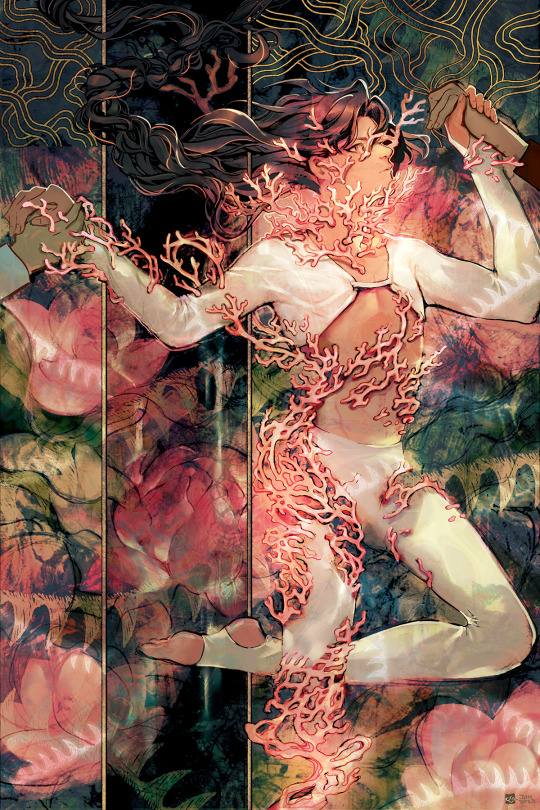
This advertisement is for The Archive Undying—a debut science fantasy epic from Emma Mieko Candon, and book one in their Downworld Sequence, featuring commissioned fanart of Sunai, the book's main character. The artist is Caitlin Ono.
WHAT IT’S ABOUT
Plugged into his AI god when its corruption renders him unfortunately immortal, sad gay disaster Sunai takes a die-again-or-die-trying approach to his tragically unending life. Despotic police states want to leash him and giant robots want to eat him, but reuniting with the small handful of people he cares about is what’s actually horrifying.
Adrift in the wilds, Sunai makes several unwise decisions such as:
Scavenging old ruins haunted by hostile fragments of another shattered technological deity
Allowing his mind to become further compromised
Sleeping with his mysterious employer for information and fun
Joining a haphazard crew of pirates who all have different motives for hunting a feral remnant of the same god that cursed him, all those years ago
This brain-melting series-starter is like a Neon Genesis Evangelion AMV set to a bass-boosted cover of George Michael’s "Careless Whisper."
#caitlin ono#fanart#the archive undying#emma mieko candon#immortal and emotional about it#gay books#mecha fiction#science fiction#science fantasy#tordotcom publishing#tordotcom#books#bookblr#lgbtqia+#giant robots#mecha
4K notes
·
View notes
Text
#felt the need to add the only fanfic option cos i know that so many people would put that as fiction#but for this i am mostly interested in purchasing or finding actual published books.#for the purpsoes of this poll comics/graphic novels count in the 'i dont read fiction or nonfiction books' as id classify them as a type
2K notes
·
View notes
Text
you ever read through all the fics of your current brain rot obsession and start looking at the ones in foreign languages you cant understand like

#tower of babel was kind of fucked up for this ngl#i was once so desperate i used google translate and yeah. doesn’t work obviously.#im also in between actual published fiction trying to find something a) i want to read and b) is free#so im really just parched crawling through the desert atm
881 notes
·
View notes
Text
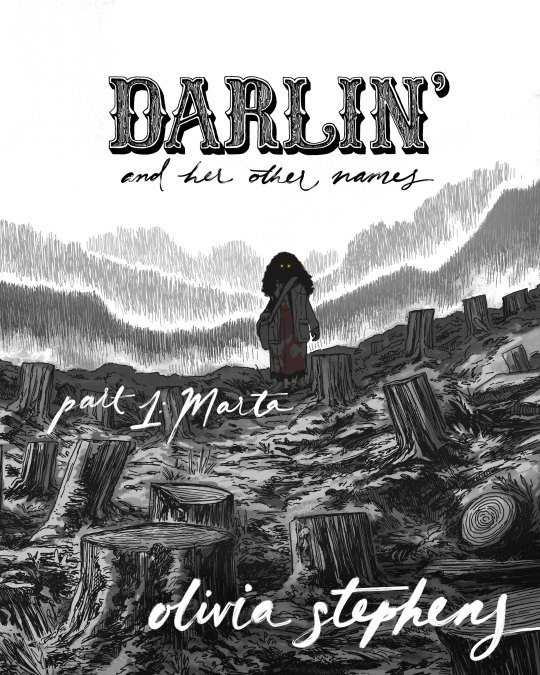
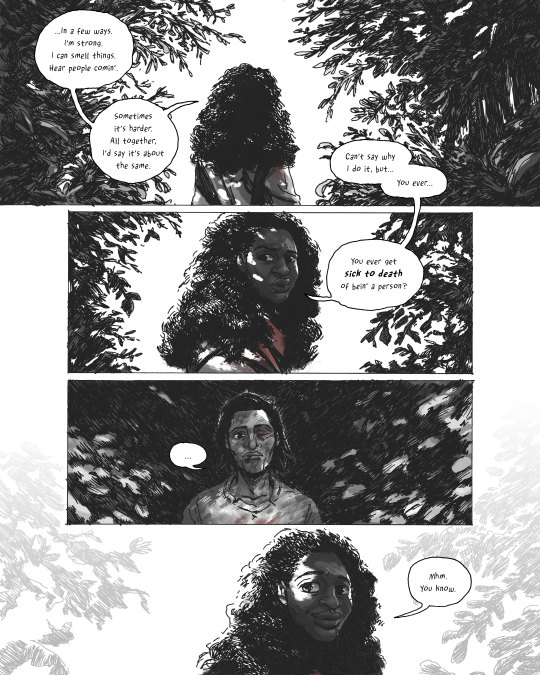
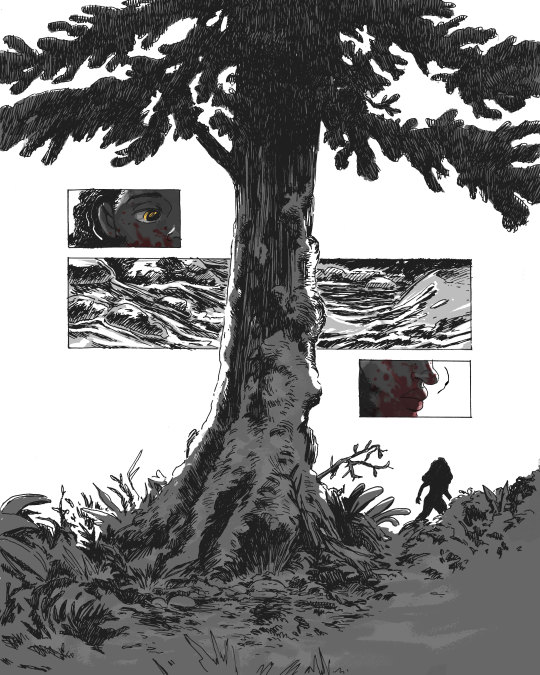

DARLIN’ AND HER OTHER NAMES, PART 1: MARTA
The first installment of my new werewolf-western-horror-romance comic is available now on gumroad and itch.io!
www.darlincomic.com
90 pages, mature readers only.
DARLIN’ is intended for mature audiences. This comic contains elements which some readers may find distressing, including:
murder, gun violence, animal cruelty and animal death, blood, gore, body injury/horror, nudity, and language.
Please proceed mindfully.
Title designs by Binglin Hu.
(Thank you to friends, family, patrons and readers for your patience and support during the making of Part 1!
I also want to give my immense thanks to Tin House, Mineral School Artist Residency, Artist Trust and MacDowell for providing time, space and support during various stages of Part 1’s progress. It means the world to receive validation for this weird little self-published project.)
#darlin' and her other names#darlin#comics#graphic novel#indie#self publishing#comic#werewolf#werewolves#cryptid#horror#western#romance#genre fiction#webcomic#indie comics
1K notes
·
View notes
Text
Chapter Three
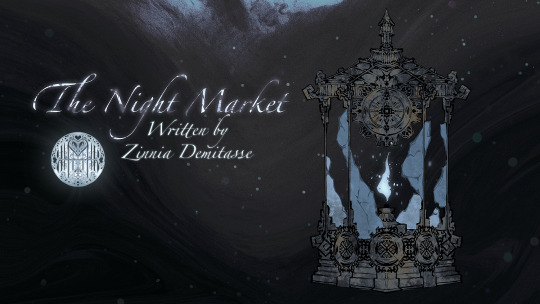
Chapter Three is here! Right now it is early release on Patreon with a public release being on April 8th. Subscribe to the Bog With tier to get access to the chapter. All asks in the next two weeks will be posted under spoilers so do not worry about getting spoiled if you have to wait.
If you do join to support me, I thank you so much! We are back on track now and it feels good!
🪷✨🪷✨ If you want to support me 🪷 ✨🪷✨
🌿 Free Demo 🌿Book 1 Steam🌿Book 1 Itch.io🌿🌿 Patreon 🌿Discord🌿FAQS🌿
#the night market#chapter three#interactive fiction#early access#indie author#self published#lgbtq#angst#writers of tumblr#vampire#angels#witches#poly
326 notes
·
View notes
Text
Writing a novel: Step by step
Most writers aspire to publish at least one book in their lifetime, but writing a novel is not easy. From new writers to experienced writers who have published hundreds of books, everyone must follow a step-by-step process to create their work. These steps are based on the wisdom of famous writers, so while they may not be entirely definitive, they will certainly be helpful to you.
Step 1: Generate ideas

Start by generating ideas for your novel. This can involve brainstorming, keeping a journal of potential story concepts, or drawing inspiration from real-life experiences, books, movies, or current events.
Once you get an idea, hone it.
Step 2: Create characters

A novel cannot be successful without unique and charming characters. Create compelling and well-rounded characters for your novel. Develop their backgrounds, motivations, personalities, and relationships. Consider their strengths, flaws, and how they will evolve throughout the story.
Remember, the more realistic the characters, the better the novel will be.
Step 3: Build setting

Establish the setting or world in which your novel takes place. Whether it's a real location or a fictional world, provide enough descriptive details to immerse readers and make the setting feel vivid and believable.
Step 4: Define plot and make an outline
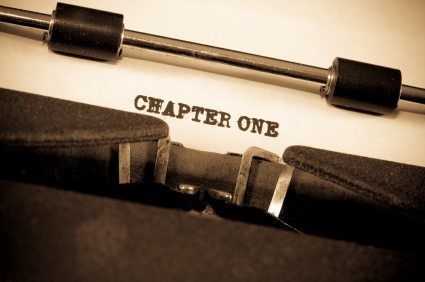
What is your story about? How will it unfold? How does it begin, develop, and conclude? What and how many scenes will be included? Make an depth and very depth outline, even going so far as to outline every chapter.
Step 5: Write

Begin writing your first draft. Don't worry about perfection; the goal is to get the story down on paper. Embrace the creative process and let the ideas flow. Please remember, don't go back and make changes. Just write!
Step 6: Revise and edit

Once the first draft is complete, take a break (for 3 days) before revising and editing. (This will keep you from overediting or not editing enough.) Then, read through your manuscript with a critical eye, focusing on plot holes, inconsistencies, pacing, character development, and overall storytelling. Revise and rewrite sections as needed.
Step 7: Get beta readers

(You must) seek feedback from trusted individuals, such as beta readers, writing critique groups or your friends. Their input can provide valuable perspectives on areas that may need improvement. Consider their suggestions while maintaining your unique voice and vision for the story.
Step 8: Polish and refine
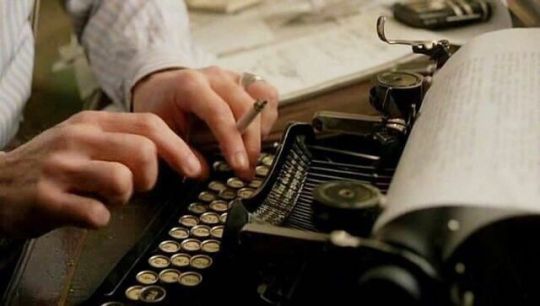
Polish and refine your novel based on the feedback received. Pay attention to sentence structure, grammar, punctuation, and overall prose. Ensure clarity and coherence in your writing.
Step 9: Publish
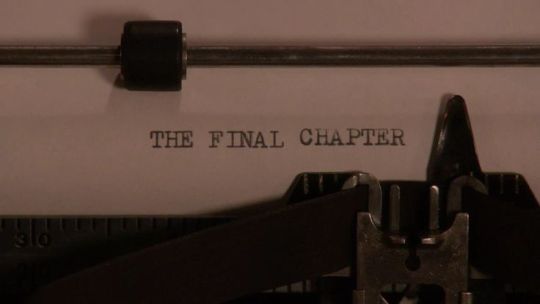
You can research different publishing options, such as traditional publishing or self-publishing. Remember to evaluate the pros and cons of each approach and decide which is the best fit for your goals and circumstances.
That's all. I hope you success in publishing your novel!!
If you want to read more posts about writing, please click here and give me a follow!
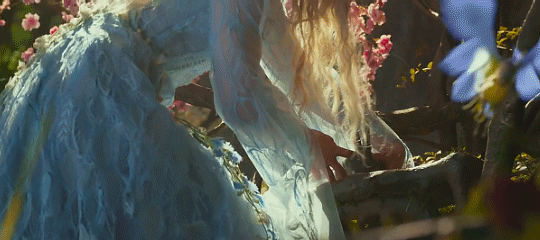
#writerscommunity#writer things#writersociety#writers#writeblr#on writing#writblr#writers on tumblr#writing#creative writing#novel#novel writing#romance novels#fiction#author#short stories#self publishing#publishing#write#writings#writer#writers and poets#writerslife#writers block#ao3 writer#writing stuff#women writers#writers life#writing community#writing tools
393 notes
·
View notes
Text
I probably don't talk about it much, especially after her passing; the fact that I loved my dog so much I created a fictional universe for her. That I wrote two novels in said universe.
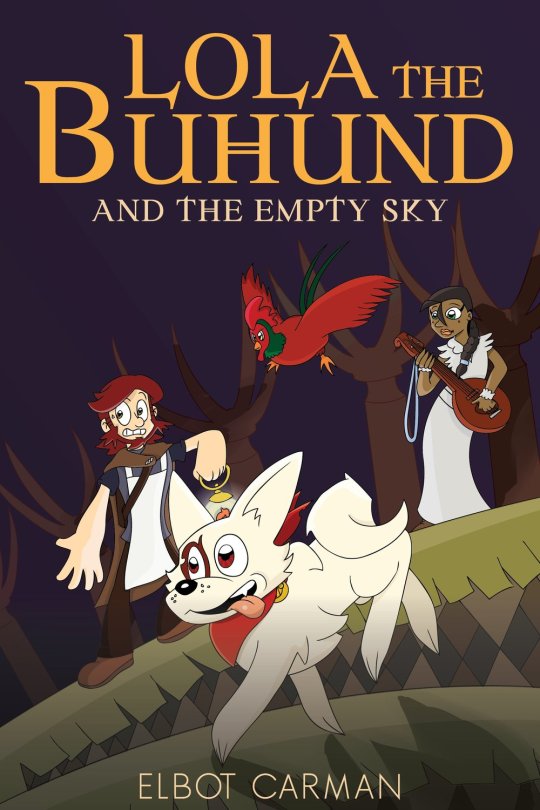

Even in spite of all the struggles I had getting them recognized, I still managed to get signed with a publisher. Sure they weren't a big one and the books didn't become bestsellers, but even getting signed was a big accomplishment for me. Even if that relationship did end.
The art may not have been great (Thank you, chronic arm/wrist issues), and the editing may not have been top-notch, but I still had an experience very few people actually have.
It's one thing to think about writing a novel. It's another to do it, and put your work out there for other people to see and judge. I did it all for her, so that some part of her would always remain in this world.
I have a few regrets, naturally. However, for my girl, I'd gladly do it all again.

Edit: I probably should have added that, due to my contracts with my former publisher not being renewed, these books are no longer available to buy.
I had posted them to Inkshares for the sake of having the text hosted somewhere, but haven't committed to funding their rerelease on there.
I'm currently planning on making them available on the book series' website for free as well. I just need to get off my rear and do it.
2K notes
·
View notes
Text
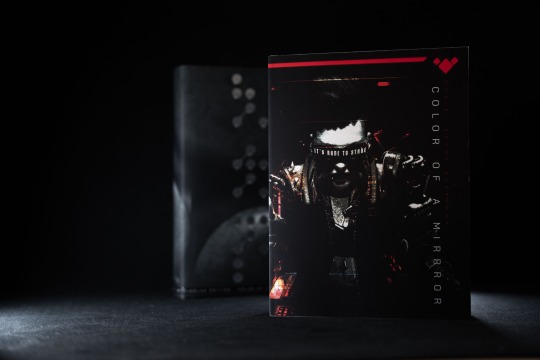


“Many say the moon is closer to the dead.”
This is COLOR OF A MIRROR, my debut novel with an original, dark ambient soundtrack by composer Josh McCausland to go along with it.
Written, designed, and published by me, it’s the culmination of years of work, and it’s exactly the story I wanted to tell. It’s not loud or bombastic, but rather a cerebral, slow-burn cyberpunk narrative lingering on themes of fame, paranoia, religion, and technology. If you’re a fan of the brooding futures of William Gibson, Blade Runner, or anything with a mood like the movie Drive, I think you’ll find something to love here.
Available exclusively on my website, it comes in limited edition deluxe-hardcover, softcover, and e-book. (And if you’re a vinyl lover, the soundtrack is pressed in 180g Moondust White; also available on my site.)
Welcome to the Dive. Hope to see you around.
-Dan
•
colorofamirror.net
(Book photos by Josh McCausland.)
#debut author#cyberpunk#cyberpunknovel#cerebral#slowburn#futuristic#dark science fiction#brutalism#minimalism#graphic design#typography#abstract art#independent publishing#dark ambient music#soundtrack#original score#tech noir#bladerunner#neuromancer#darkfuturism
314 notes
·
View notes
Photo

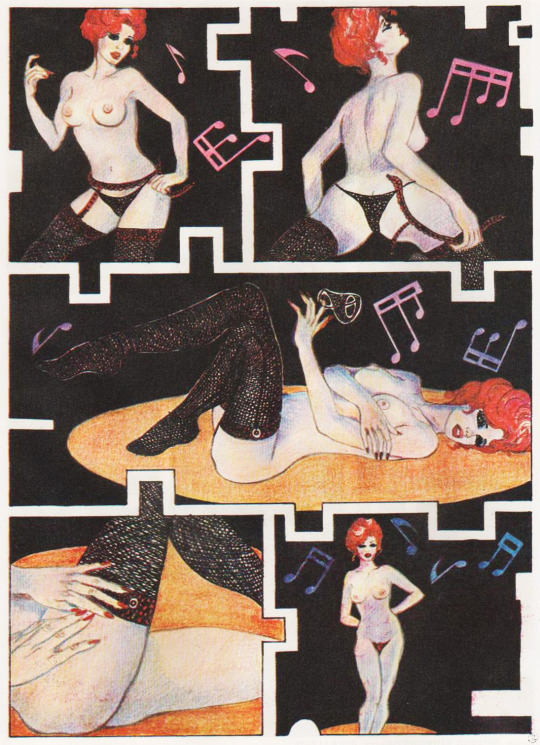


Rosalleida (Maria Rosa Lleida), 'Strip', ''1984'', 1983
Source
It’s a metaphor about contemporary discourse on AI from the past.
#maria rosa lleida#Rosalleida#spanish artists#1984#1984 magazine#warren publishing#science fiction art#scifi art#comic art#comic illustration
662 notes
·
View notes
Text
Submission Spotlight: Guernica
If you're looking for a lit mag to place short fiction with a slant towards originality (or even weirdness) and a lot of interiority, may I suggest Guernica? They're open now, and there's no fee. Competition is a tough, so send your best! #publishing
As of May 2023, Guernica is currently open for no-fee submissions here (follow their link to create a free Submittable account). Founded in 2004, Guernica publishes poetry, essays, fiction, criticism, and journalism online. Unlike most magazines, it pays contributors rather than staff; in fact, its staff are entirely volunteers. Rather than a university affiliation, the magazine is partnered with…
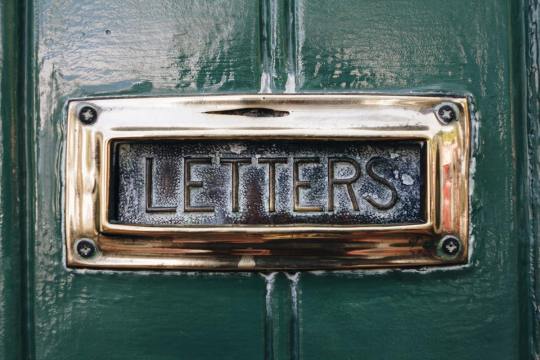
View On WordPress
#Guernica#literary editors#literary journals#literary magazines#literary marketplace#no submission fee journal#paying markets for short stories#publishing fiction#publishing short stories#Rachel Khong#Sarmista Das#submissions#Submittable for writers#submitting fiction#The Los Angeles Review of Books#Yorgos Lanthimos
0 notes
Text
Kickstarting “The Bezzle” audiobook, sequel to Red Team Blues
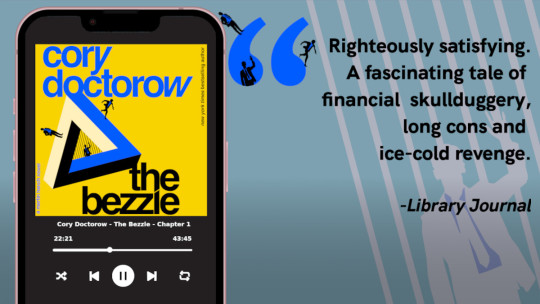
I'm heading to Berlin! On January 29, I'll be delivering Transmediale's Marshall McLuhan Lecture, and on January 30, I'll be at Otherland Books (tickets are limited! They'll have exclusive early access to the English edition of The Bezzle and the German edition of Red Team Blues!).

I'm kickstarting the audiobook for The Bezzle, the sequel to last year's Red Team Blues, featuring Marty Hench, a hard-charging, two-fisted forensic accountant who spent 40 years in Silicon Valley, busting every finance scam hatched by tech bros' feverish imaginations:
http://thebezzle.org
Marty Hench is a great character to write. His career in high-tech scambusting starts in the early 1980s with the first PCs and stretches all the way to the cryptocurrency era, the most target-rich environment for scamhunting tech has ever seen. Hench is the Zelig of tech scams, and I'm having so much fun using him to probe the seamy underbelly of the tech economy.
Enter The Bezzle, which will be published by Tor Books and Head of Zeus on Feb 20: this adventure finds Marty in the company of Scott Warms, one of the many bright technologists whose great startup was bought and destroyed by Yahoo! (yes, they really used that asinine exclamation mark). Scott is shackled to the Punctuation Factory by golden handcuffs, and he's determined to get fired without cause, so he can collect his shares and move onto the next thing.
That's how Scott and Marty find themselves on Catalina island, the redoubt of the Wrigley family, where bison roam the hills, yachts bob in the habor and fast food is banned. Scott invites Marty on a series of luxury vacations on Catalina, which end abruptly when they discover – and implode – a hamburger-related Ponzi scheme run by a real-estate millionaire who is destroying the personal finances of the Island's working-class townies out of sheer sadism.
Scott's victory is bittersweet: sure, he blew up the Ponzi scheme, but he's also made powerful enemies – the kinds of enemies who can pull strings with the notoriously corrupt LA County Sheriff's Deputies who are the only law on Catalina, and after taking a pair of felony plea deals, Scott gets the message and never visits Catalina Island again.
That could have been the end of it, but California's three-strikes law – since rescinded – means that when Scott picks up one more felony conviction for some drugs discovered during a traffic stop, he's facing life in prison.
That's where The Bezzle really gets into gear.
At its core, The Bezzle is a novel about the "shitty technology adoption curve": the idea that our worst technological schemes are sanded smooth on the bodies of prisoners, mental patients, kids and refugees before they work their way up the privilege gradient and are inflicted on all of us:
https://pluralistic.net/2023/04/12/algorithmic-wage-discrimination/#fishers-of-men
America's prisons are vicious, brutal places, and technology has only made them worse. When Scott's prison swaps out in-person visits, the prison library, and phone calls for a "free" tablet that offers all these services as janky apps that cost ten times more than they would on the outside, the cruelty finds a business model.
Working inside and outside the prison Marty Hench and Scott Warms figure out the full nature of the scam that the captive audience of prisoners are involuntary beta-testers for, and they discover a sprawling web of real-estate fraud, tech scams, and offshore finance that is extracting fortunes from the hides of America's prisoners and their families. The criminals who run that kind of enterprise aren't shy about fighting for what they've got, and they're more than happy to cut some of LA County's notorious deputy gangs in for a cut in exchange for providing some kinetic support for the project.
The Bezzle is exactly the kind of book I was hoping I'd get to write when I kicked off the Hench series – one that decodes the scam economy, from music royalties to prison videoconferencing, real estate investment trusts to Big Four accounting firm bogus audits. It's both a fast-moving, two-fisted crime novel and a masterclass on how the rich and powerful get away with both literal and figurative murder.
It's getting a big push from both my publishers and I'll be touring western Canada and the US with it. The early reviews are spectacular. But despite all of this, I had to make my own audiobook for it, which I'm pre-selling on Kickstarter:
http://thebezzle.org
Why? Because Audible – Amazon's monopoly gatekeeper to the audiobook world, with more than 90% of the market – refuses to carry my work.
Audible uses Digital Rights Management to lock every audiobook they sell to their platform. Legally, only an Audible-authorized app can decrypt and play the audiobooks they sell you. Distributing a tool that removes Audible DRM is a felony under Section 1201 of the 1998 DMCA.
That means that if you break up with Audible – delete your Audible apps – you will lose your entire audiobook library. And the fact that you're Audible's hostage makes the writers you love into their hostages, too. Writers understand that if they leave the Audible platform, their audience will have to choose between following them, or losing all their audiobooks.
That's how Audible gets away with abusing its performers and writers, up to and including the $100m Audiblegate wage-theft scandal:
https://www.audiblegate.com/
Audible can steal $100m from its writers…and the writers still continue to sell on the platform, because leaving will cost them their audience.
This is canonical enshittification: lock in users, then screw suppliers. Lots of companies abuse DRM to do this, but none can hold a candle to Amazon, who understand that the DMCA is a copyright law that protects corporations at the expense of creators.
Under DMCA 1201 commercial distribution of a "circumvention device" carries a five-year prison sentence and a $500,000 fine. That means that if I write a book, pay to have it recorded, and then sell it to you through Audible, I am criminally prohibited from giving you the tool to take it from Audible to another platform. Even though I hold the copyright to that work, I would face a harsher sentence than you would if you simply pirated the audiobook from some darknet site. Not only that: if you shoplifted the audiobook in CD form, you'd get a lighter sentence than I, the copyright holder, would receive for giving you a tool to unlock it from Amazon's platform! Hell, if you hijacked the truck that delivered the CD, you'd get off lighter than I would. This is a scam straight out of a Marty Hench novel.
This is batshit. I won't allow it. My books are licensed on the condition that they must not be sold with DRM. Which means that Audible won't sell my books, which means that my publishers are thoroughly disinterested in paying thousands of dollars to produce audiobooks of my titles. A book that isn't sold in the one store than accounts for 90% of all sales is unlikely to do well.
That's where you come in. Since 2020, I've used Kickstarter to pre-sell five of my audiobooks (I wrote nine books during lockdown!). All told, I've raised over $750,000 (gross! but still!) on these crowdfunders. More than 20,000 backers have pitched in! The last two of these books – The Internet Con and The Lost Cause – were national bestsellers.
This isn't just a way for me to pay off a lot of bills and put away something for retirement – it's proof that readers care about supporting writers and don't want to be locked in by a giant monopolist that depends on its drivers pissing in bottles to make quota.
It's a powerful message about the desire for something better than Amazon. It's part of the current that is driving the FTC to haul Amazon into court for being a monopolist, and also part of the inspiration for other authors to try treating Amazon as damage and routing around it, with spectacular results:
https://www.kickstarter.com/projects/dragonsteel/surprise-four-secret-novels-by-brandon-sanderson

And I'm doing it again. Last December, I went into Skyboat Media's studios where Gabrielle De Cuir directed @wilwheaton, who reprised his role as Marty Hench for the audiobook of The Bezzle. It came out amazing:
https://archive.org/details/bezzle-sample
Now I'm pre-selling this audiobook, as well as the ebook and hardcover for The Bezzle. I'm also offering bundles with the ebook and audiobook for Red Team Blues (naturally these are all DRM-free). You can get your books signed and personalized and shipped anywhere in the world, courtesy of Book Soup, and I've partnered with Libro.fm to deliver DRM-free audiobooks with an app for people who don't want to mess around with sideloading.
I've also got some spendy options for high rollers. There's three chances to name a character in the next Hench novel (Picks and Shovels, Feb 2025). There's also five chances to commission a Hench short story about your favorite tech scam, and get credited when the story is published.
The Kickstarter runs for the next three weeks, which should give me time to get the hardcopy books signed and shipped to arrive around the on-sale date. What's more, I've finally worked out all the post-Brexit kinks with shipping my UK publisher's books to EU backers. I'm working with Otherland Books to fulfill those EU orders, and it looks like I'm going to be able to sign a giant stack of those when I'm in Berlin later this month to give the annual Marshall McLuhan lecture at the Canadian embassy:
https://transmediale.de/en/2024/event/mcluhan-2024
Red Team Blues and its sequels are some of the most fun – and informative – work I've done in my quarter-century career. I love how they blend technical explanations of the scam economy with high-intensity technothrillers. That's the the same mix as my bestselling YA series Little Brother series – but these are firmly adult novels.
The Bezzle came out great. I hope you'll give it a try – and that you'll come out to see me in late February when I hit the road with the book! Here's that Kickstarter link again:
http://thebezzle.org

If you'd like an essay-formatted version of this post to read or share, here's a link to it on pluralistic.net, my surveillance-free, ad-free, tracker-free blog:
https://pluralistic.net/2024/01/10/the-bezzle/#marty-hench
#pluralistic#kickstarter#audible#the bezzle#bezzles#prison tech#disciplinary technology#crowdfunding#wilw#wil wheaton#audiobooks#publishing#science fiction#marty hench#martin hench#red team blues#shitty technology adoption curve#reits
661 notes
·
View notes